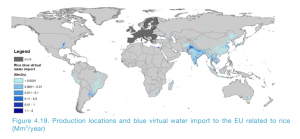Traditional Japanese Cuisine Threatened by Global Water Problems
Edamame, rice and growing meat and dairy sector most at risk
Tokyo, 17 September 2018: Research into how increasing water scarcity and drought may impact the Japanese economy (1) was released by R2Water (2) and FutureWater (3) at a press briefing at the IWA World Water Congress & Exhibition 2018 (4) in Tokyo today.
The research found that 72% of Japan’s water demand lies outside its borders because many of the goods consumed or used by its citizens and businesses are produced abroad. Most of the foreign water that Japan depends upon is used predominantly for agricultural products and comes from five countries: the United States of America (USA) (30%); Brazil (8%); Australia (8%); China (7%); and India (7%).
Dr.Ertug Ercin, Director of R2Water, a member of International Water Association (IWA) and lead author of the research, said: “Many of the staple foods on our table are under threat from water scarcity and drought happening miles away, far from our borders. Take Japan. Many traditional ingredients, like edamame beans and rice – as well as popular meat and dairy products – are imported from countries that are highly vulnerable to water scarcity and drought. Disruption of supplies of these key commodities could disrupt the country’s economic stability and food security.”
Around 80% of soybean, 72% of rice and 65% of maize supply to Japan is highly vulnerable to water scarcity in producing regions. Given its reliance on imports of soybean and maize from the USA, China and India for animal feed and direct food consumption, Japan’s meat and dairy sector, as well as foods like edamame, miso, tofu and rice are directly at risk in the near term from disruption to water availability in those countries. Increased imports of rice, mostly due to cheaper prices, are also subject to the threat of water scarcity.
Japan is also indirectly at risk via its trading partnership with the EU, which relies heavily on soybean imports for animal feed and supplies meat to Japan. If climate change alters rainfall patterns, soybean supplies would be further affected because it is a rainfed crop. This means Japan may see a far greater negative impact on its economy in the longer term.
Prof. Dr. Bart van den Hurk, leader of the EU IMPREX project (1) and Research and Development Manager of Weather and Climate Risk at the Dutch Meteorological Institute (KNMI), said: “In an interconnected world, our economy and society will be affected by water and climate change impacts that occur beyond its borders. This study illustrates that climate change impacts are not a local or regional feature but a global phenomenon.”
“The International Water Association, through its membership of water professionals, provides the basis for evidence-informed policies and strong solution strategies. This is fundamental to build our global village’s resilience to address the water challenges the world is facing,” said Prof. Kala Vairavamoorthy, IWA Executive Director. “It is paramount that research findings of this calibre are communicated to experts and decision-makers with the capacity to exert change,” he continued. “They are coming together at this year’s edition of the IWA World Water Congress & Exhibition in Tokyo to close the gap between research and practice.”
ENDS
Contact:
PRESS BRIEFING: At the IWA Pavilion (booth No.115 and No.74), IWA World Water Congress & Exhibition 2018, 17 September at 10.30 JST. For details contact: Marta Jimenez: Communications Officer, IWA: +31 631 934 081
Dr. Ertug Ercin, Director, R2Water: + 31 (0)6 1736 6472. Dr Ercin will be at the IWA World Water Congress & Exhibition 2018 throughout the week and is available for interviews.
Matilda Bradshaw, Communications Advisor, R2Water: +44 (0)749398 1940 (UK)
Notes to Editors:
- Download the briefing paper on Japan’s vulnerability to water scarcity and drought. The data used for this research is extracted from ‘Dependencies of Europe’s economy on other parts of the world in terms of water resources’ Authors: Dr. Ertug Ercin, Daniel Chico Zamanillo and Dr. Ashok Chapagain). This research was produced by R2Water and FutureWater for Improving Predictions and Management of Hydrological Extremes (IMPREX), part of the EU’s Horizon 2020 grant programme. The programme aims to improve society’s ability to anticipate and respond to the impacts of climate change.
- R2Water is a research and communications consultancy, based in the Netherlands, that aims to strengthen the links between science, policy and practice to contribute to a sustainable, secure and fair world.
- FutureWater is a research and consulting organisation that works throughout the world to combine scientific research with practical solutions for water management. FutureWater leads the “Water Economy” research in IMPREX project.
- The IWA World Water Congress & Exhibition 2018 is taking place at The Tokyo International Exhibition Centre (Tokyo Big Sight) on 16 -21 September 2018 – see http://worldwatercongress.org/.


